News reports about U.S.-Israeli relations often feature two contradictory refrains: “The bond between the two countries is unshakable,” and “The crisis between the two countries is unprecedented.” On Wednesday, the U.S. House of Representatives passed H.R. 938, The United States-Israel Strategic Partnership Act of 2014, strengthening the already deep strategic partnership between the two countries. The Senate had previously approved the bill unanimously and it now goes to the White House for the president to sign. At the same time, there continue to be a stream of reports on the tension between the United States administration and the Israeli government, with personal insults at the highest levels of government hurled across the Atlantic (anonymously in some cases and ostensibly off-the-record in others).
Lost in this drama are the high-stake issues at hand. On some of these issues, real, substantive, disagreements exist between the two countries; on others, the two administrations remain very close.
Over the past 11 years, The Saban Forum, organized by the Center for Middle East Policy at the Brookings Institution, has become the primary gathering place for the top echelon of U.S. and Israeli officials, experts, and journalists to engage in a dialogue about these issues. The majority of the Forum discussions are held off the record, allowing for candid and at times heated debates. This year’s Forum will also feature public remarks by Prime Minister Benjamin Netanyahu, Secretary of State John Kerry, and former Secretary of State Hillary Rodham Clinton, all of which will be webcast live here.
Key issues to be discussed at this year’s Forum include:
Iran’s Nuclear Program
While the United States and Israel remain closely coordinated on the issue of confronting Iran’s nuclear program, significant differences of opinion remain. The P5+1 group of countries and Iran have recently extended their talks, and, in broad terms, the Joint Plan of Action (the interim agreement) remains in place. In general, Israelis are wary of the diplomatic approach; when the Joint Plan of Action was signed in November 2013, Prime Minister Netanyahu called it a “historic mistake,” though the Israeli stance on the interim agreement has since softened.
In the immediate future, we can expect a heated debate between Israel and the Obama administration—and inside Washington—over whether to impose new sanctions on Iran while negotiations continue and what new sanctions might mean for Iran’s calculus moving forward. As in previous Forums, senior Israeli and American officials and experts will engage these issues directly.
The Israeli-Palestinian Conflict
During the 2013 Saban Forum, while negotiations were taking place between Israelis and Palestinians mediated by Secretary Kerry and Special Envoy Martin Indyk, the director of the Foreign Policy Program at Brookings, Secretary Kerry gave a public address on the topic. One year later, the negotiations have stalled and the sides are recovering from this summer’s bitter conflict between Israel and Hamas in the Gaza Strip. Violence and gruesome attacks in Jerusalem and elsewhere have been ongoing since June.
Since last year’s Forum, differences between Israel and the United States have resurfaced, in particular over continued Israeli construction in parts of the West Bank and in East Jerusalem. Among Israelis and Palestinians there are voices calling for abandoning the two-state solution altogether.
This year’s Forum will address the aftermath of the negotiations, the future of the conflict, and possibilities for future initiatives to resolve it.
Regional Turmoil
Since the last Forum, a dramatic shift has also occurred in the U.S. posture in the Middle East. For several years, Middle Eastern governments and observers were concerned over a perceived U.S. withdrawal and a re-balance of U.S. efforts away from the Middle East and toward Asia. At the same time, the region has seen unprecedented civil strife, massive refugee and internal displacement problem, and a weakening of fundamental state structures. During this past year, the United States has once again intervened militarily in Iraq and Syria to try and degrade and eventually destroy the Islamic State group (also known as ISIS/ISIL).
Israel remains watchful of the deteriorating security situation along its borders. Thus far, Israel has been largely neutral in the civil strife in Syria. It has coordinated closely with the new regime in Egypt on security in the Sinai. And it remains vigilant about transfer of advanced weaponry to the Lebanese Hezbollah. At the same time, while not directly involved in fighting the Islamic State group, Israel continues to be a close intelligence partner of the United States.
Definitions of Nationality, Democracy, and Pluralism
A cornerstone of the U.S.-Israeli relationship has been the shared values of the two democracies. In the past year, several issues have surfaced that have strained this shared vision. Most recently, a bill affirming Israel’s status as a the nation state of the Jewish people has created tensions within Israel, receiving criticism from the country’s president, as well as from a number of major American Jewish organizations, some of whom are critical of the priority given to Orthodox Judaism in Israeli. Concerns have been voiced in both countries over the status of non-Jewish citizens of Israel, who comprise some 20% of Israel’s population.
This year’s Forum will explore some of the value issues that define the special relationship between the countries, as well as areas of disagreement.
The Future of U.S.-Israeli Relations
The Forum will also take a deep dive on the future of U.S.-Israeli relations, including trends in public opinion on Israel among different demographic and partisan segments of the American public and how these trends may affect the relationship in the years and decades to come. We will also examine trends in Israeli public opinion toward U.S. policy and U.S.-Israeli relations. In recent years, some politicians in Israel have seen political gain in confronting U.S. pressure, and as Israel is poised to enter a new election cycle, candidates have already tried to gain politically by criticizing the Netanyahu government for the apparent deterioration in U.S.-Israeli relations.
As is tradition, the Forum will begin with a public launch of a new poll by Brookings nonresident Senior Fellow Shibley Telhami addressing some of these issues directly.
For more on the Forum, stay tuned online, and on twitter: #Saban14
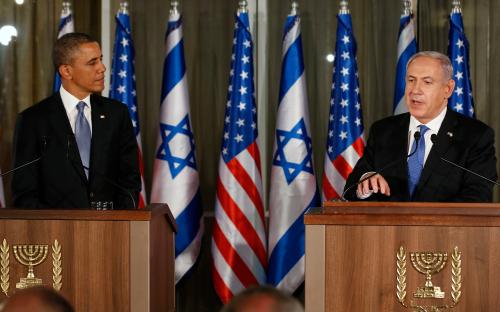
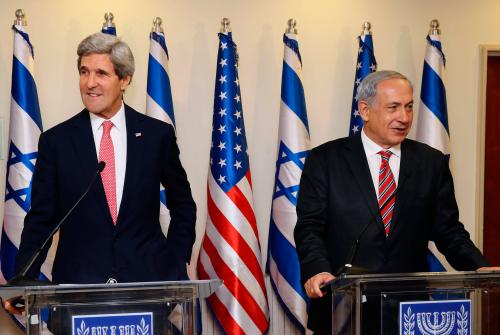
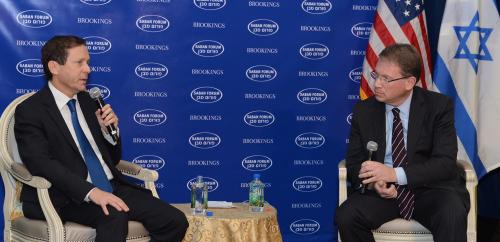
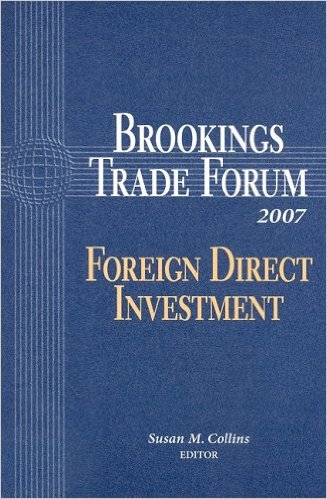
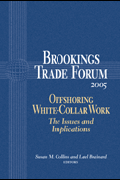
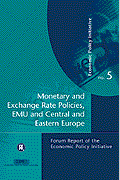



Commentary
Unprecedented Tension in an Unshakable Relationship? U.S.-Israeli Dialogue in Time of Crisis
December 4, 2014